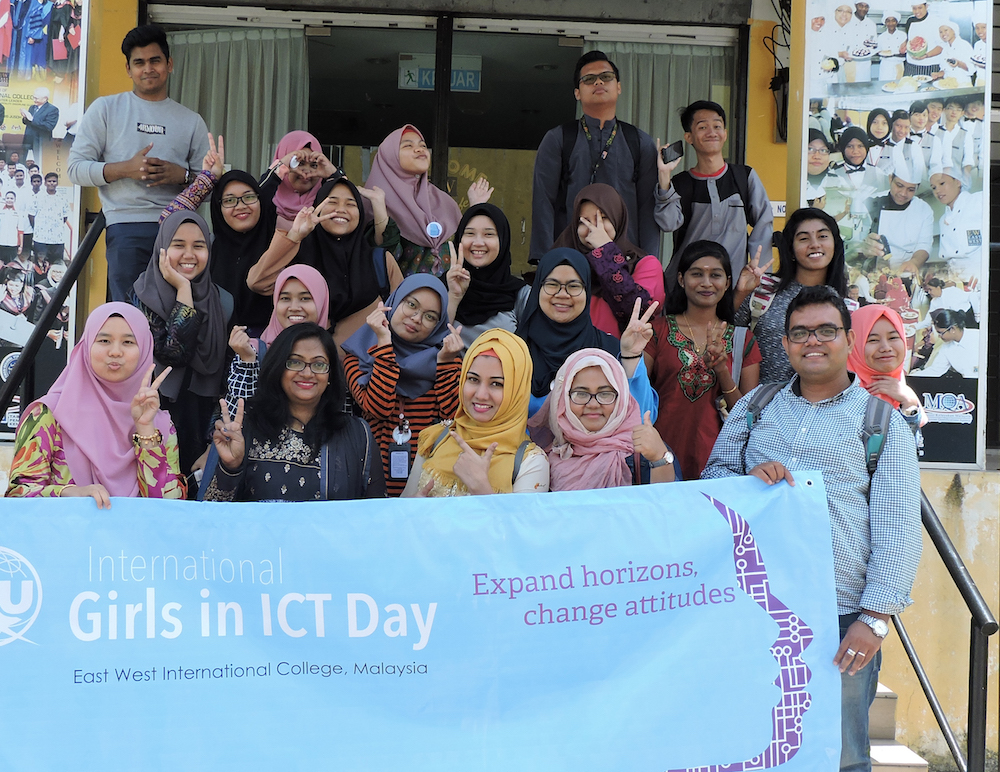GBC-Education Speaks with Pavel Sarwar On International Day of Women and Girls in Science

Today is International Day of Women and Girls in Science – an international day highlighting the gender gap in science, technology, engineering, and math (STEM) and the roadblocks to creating a more equitable workforce. To commemorate the day, the Global Business Coalition for Education (GBC-Education) spoke with Pavel Sarwar – a Global Youth Ambassador at Theirworld and social entrepreneur based in Malaysia who works to solve social and community problems with technology.
Below, you will find an interview with Pavel, focused on the importance of ICT skills for girls and women, and what role he sees business playing in ensuring Sustainable Development Goal 4 is fulfilled.
Q: Based on your experience, what do you see as the greatest roadblock for women and girls in accessing education and skills development – especially when it comes to technical skills?
A: The roadblock for women and girls in accessing technical skills is that the long-held notion that men are mathematically superior and better suited to STEM fields. Many girls and women report that they are not interested in science and engineering and a lack of information means women and girls are not fully aware of the advantage of technical skills.
Parents and teachers encourage girls much less than boys in pursuing ICT skills education. Secondary school girls tend to exhibit a lower interest and confidence in STEM subjects compared to other subjects and there are fewer female role models in technology that exist to drive girls’ aspirations in STEM.
Girls and women have lower access to ICT tools and connectivity than boys and men. Women and girls in some geographical contexts have limited mobility, which restricts their access to in-person ICT training. The issue around safety and protection of women and girls voices and influence in the online arena is also of growing concern. Women and girls face increasing online harassment, which limits their online activities and thus their opportunities to use the digital space for professional skills development (i.e. ICT skills trainings).
Q: What role do you think the business community should play in supporting young women realize their potential?
A: The global business community must support women to realize their full potential as leaders in all professional spheres. I suggest that support be given to build women’s communication skills; to give women decision-making roles and to provide the space for leadership potential to flourish. There is also something to be said for creating an agile working environment, one where women can take advantage of flexible work schedules so that they can manage their family as well as work. Sectors such as ICT already offer the agility that many women workers would benefit from.
Business leaders, both men and women alike, must appreciate and nurture the entrepreneurial talent offered by women, particularly in the age of the fourth industrial revolution. This can be achieved by investing in women-led small businesses, and providing coaching / mentoring for women through business engagement programs.
Q: How have you (as a Global Youth Ambassador) taken steps to close the gender gap in education? Please offer any examples or stories from your organization’s work.
A: I co-founded a global platform called the Youth Hub in Malaysia which is a space where youths can exchange their ideas and embark on new initiatives. Currently Youth Hub is working to educate and enable school students, especially girls, in computer science. We make computer science about connecting code to community outreach and to unleashing young people’s passions, such as art, website development, or even hardware coding!
My belief is that if girls understand all the different functions and ways of working with ICT, they will have more of a stake in in how ICT is used in their communities, in their places of work, and in government.
That’s why, as part of Youth Hub, I started the initiative named Girls Programming Camp. The camp targets girls and young women from local secondary schools and colleges who are interested in computer programming and ICT. Once enrolled, the girls are taught the basics about ICT, HTML, CSS, Python, C programming, and C++ programming language.
The results so far have indicated that girls and young women not only enjoy learning more about technology, they are keen to apply this knowledge in all areas of their academic and personal lives, whether this be to apply for further study or to find secure jobs in ICT and STEM-based roles.
Q: As a young person, have you found that your education in science, technology, engineering, and math (STEM) was useful? Was STEM an important part of your schooling?
A: Yes, my education till now is useful, but there is more work to be done to to reduce the skills gap between academia and Industry. This disconnect is hindering the possibility of many talented young people (women and men alike) from entering STEM-based sectors following their studies.
Q: If you could send a message to leaders in your community (business, government, civil society, etc.) to encourage them to address gender inequality and support STEM training, what would you say?
A: One of the biggest issues I see when we talk about women and gender equality, especially in the workplace, is in Information and Communication Technology (ICT). There are a limited number of working sectors in ICT. Women are one half of our nation in Bangladesh, so opportunities in ICT should be open to women as well as men. Encouraging and supporting women into these technology-led workplaces will help to progress Bangladesh as a digitalized country.
Business, government, civil society etc can contribute to supporting girls’ and women’s ICT skills. They can explore new approaches to enable girls and women to access the Internet and ICT tools and training. They can also support gender equality policies in the workplace. They can provide research and knowledge sharing to dismantle gender stereotypes around technology, improve ICT training for women, and leverage existing networks to link ICT trainers and employers to ease women’s transition into the workforce. Private sector businesses can provide women basic and applied ICT skills through existing jobs and supply chains, create remote work or telecommuting options, highlight successful women working in ICT and, most importantly, partner with and recruit more women from ICT training programmes.
Industry and government alike must give support to women to do what they love, to fulfil their aspirations in technology. We must inspire women to change the world.
 Pavel Sarwar is a social entrepreneur and community leader, working within tech entrepreneurship, public service innovation, tech education, and community development. Pavel is the founder and Director of Codex Software Solution Sdn. Bhd. CODEX is a Malaysia, Bangladesh and Nepal based Tech Company working with a view to solve social and community problems with technology solutions. He is also the co-founder of Youth Hub. Youth Hub is a global platform for young people, focusing on innovation, technology, and entrepreneurship. Pavel is also the Technology Officer of Commonwealth Youth Innovation Centre. The Commonwealth Youth Centre For Innovation Leadership as a hub to develop human capital to drive economic and societal innovation, foster unity, and transform societies through sustainable impact. In 2015, Pavel was presented with the Young Entrepreneur Award by the Bangladesh Open source Network (BdOSN).
Pavel Sarwar is a social entrepreneur and community leader, working within tech entrepreneurship, public service innovation, tech education, and community development. Pavel is the founder and Director of Codex Software Solution Sdn. Bhd. CODEX is a Malaysia, Bangladesh and Nepal based Tech Company working with a view to solve social and community problems with technology solutions. He is also the co-founder of Youth Hub. Youth Hub is a global platform for young people, focusing on innovation, technology, and entrepreneurship. Pavel is also the Technology Officer of Commonwealth Youth Innovation Centre. The Commonwealth Youth Centre For Innovation Leadership as a hub to develop human capital to drive economic and societal innovation, foster unity, and transform societies through sustainable impact. In 2015, Pavel was presented with the Young Entrepreneur Award by the Bangladesh Open source Network (BdOSN).
